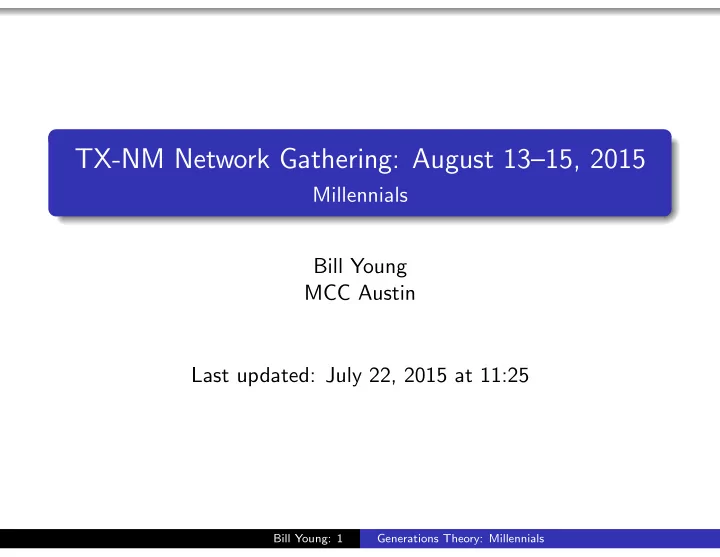

TX-NM Network Gathering: August 13–15, 2015 Millennials Bill Young MCC Austin Last updated: July 22, 2015 at 11:25 Bill Young: 1 Generations Theory: Millennials
Millennials or Generation Y (b. 1982–2003) Generation of around 80 million born after Generation X. Variously called: “Millennials” (coined by Strauss and Howe) “Generation Y” (from 1993 Ad Age article) “Echo Boomers” due to the large size of the generation “Generation 9/11” “Trophy Kids” (author Ron Alsop, referring to tendency to reward participation rather than accomplishment) Bill Young: 2 Generations Theory: Millennials
Characteristics There is a wide divergence of opinions about what characterizes Millennials. Strauss and Howe believed that Millennials would be a Civic generation, the “next great generation.” Jean Twenge ( Generation Me ) found traits of confidence and tolerance, but also entitlement and narcissism Pew Research found them more upbeat than older adults about America’s future—49% believe America’s best days lie ahead Value wealth more than previous generations (UCLA) Value less than previous generations: political awareness, environmental activism, and developing a meaningful philosophy of life Bill Young: 3 Generations Theory: Millennials
Gen X vs. Gen Y Bill Young: 4 Generations Theory: Millennials
In a Nutshell Nurtured by omnipresent parents, optimistic and focused Respect authority Falling crime rates and teen pregnancy rates Schedule everything Feel enormous academic pressure Prefer digital environments Enjoy teamwork See the world as a 24/7 place Believe they are “special” Seek affirmation and accolades Bill Young: 5 Generations Theory: Millennials
Characteristics Traits attributed may apply to “white, affluent teenagers who accomplish great things as they grow up in the suburbs, who confront anxiety whan applying to super selective colleges, and who multitask with ease as their helicopter parents hover about them.” (Fred Bonner, Rutgers Univerity) But Millennials are a highly diverse group. Generalizations may not apply to black and Hispanic students. Bill Young: 6 Generations Theory: Millennials
Characteristics David Burstein ( Fast Future ) describes Millennial’s approach to social change as “pragmatic idealism.” They have a desire to improve the world but understand that that means building new institutions and working inside and outside existing institutions. Hold generally socially and culturally liberal views. Strongly support same-sex marriage 64% favor legalizing marijuana Somewhat less supportive of abortion than Gen X Why do you suppose that is? Bill Young: 7 Generations Theory: Millennials
Economics Prospects for Millennials have declined, largely due to the Great Recession. Youth unemployment in the U.S. reached a record 19.1% in July 2010. In April 2012, half of new college grads were unemployed or underemployed. Many Millennials were living with parents. Millennials suffered most from the economic recovery, with average incomes falling at twice the average adult drop. Millennials have benefitted least from the economic recovery Bill Young: 8 Generations Theory: Millennials
Social Consequences Millennial are marrying later than earlier generations May be in response to the mistakes of their parents Economy has a dampening effect on dating and courtship Decline in full-time jobs with benefits for non-degreed folks has depressed marriage in the working class ranks Bill Young: 9 Generations Theory: Millennials
Generations Theory Recall that Strauss and Howe believe that the Millenials will be the next Civic/Hero generation (like the GIs). Sense of identity comes from belonging, not from within. Strong trust of institutions and collective action. Fitting in is more important than standing out. Often the needs of the group must supercede the needs of the individual. “This generation is going to rebel by behaving not worse, but better. Their life mission will not be to tear down old institutions that don’t work, but to build up new ones that do.” –Strauss and Howe (2000) What do you think? Were they right Bill Young: 10 Generations Theory: Millennials
Millennials and the Church In the U.S. Millennials are the least likely to be religious. 75% identify as religiously affiliated 25% are “Nones” 3% self-identity as atheist 4% self-identity as agnostic Many Millennials grew up in unchurched homes. They don’t know anything about church culture or see the value of church to their lives. “When Bill Graham preaches revivals he is preaching to people who once had religion and lost it. With this generation there is nothing to revive.” –Chris Seay Bill Young: 11 Generations Theory: Millennials
Reaching Millennials According to author Frank Powell, the following are 10 reasons churches are not reaching Millennials. 1 Resistance to change 2 A compelling vision is lacking or non-existent 3 Mediocrity is the expectation 4 A paternalistic approach to leading millennials 5 Pervasive insider-focused mentality 6 Transparency and authenticity are not high values 7 Mentoring is not important 8 Culture is viewed as the enemy 9 Community is not valued 10 The church is a source of division, not unity Are these true of your church? What are you doing about it? Do you think the emerging church movement would appeal to Millennials? Bill Young: 12 Generations Theory: Millennials
Exercise Gather again into groups at your table. Within your group compose a stewardship letter aimed at the Millennials of your congregation. 1 What sorts of things are likely to motivate these givers? 2 What don’t they want to hear? 3 How does this letter differ than those you wrote for the older generations? 4 Suppose they found out that you are crafting a letter specifically for them. Do you think they’d feel that this is manipulative? Bill Young: 13 Generations Theory: Millennials
Recommend
More recommend